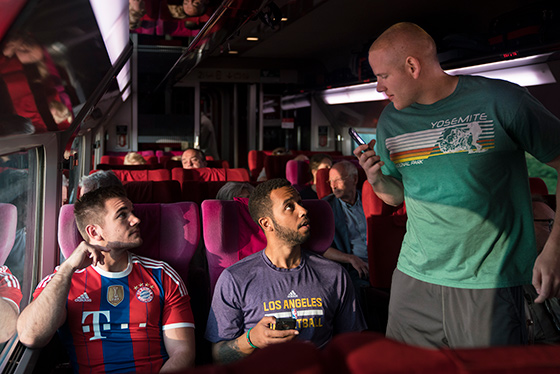The 15:17 to Paris
This rare misfire for director Clint Eastwood is a well-intentioned attempt to dig beneath the headlines and bring authenticity to this military-themed example of ordinary people doing extraordinary things, except it never quite comes together.

Photo: Keith Bernstein. Copyright: © 2018 WARNER BROS. ENTERTAINMENT INC.

Nothing can diminish the true-life courage shown by three quick-thinking Americans who thwarted a terrorist attack aboard a European high-speed train in 2015 — not even their own wooden acting.
It’s not entirely their fault that The 15:17 to Paris doesn’t provide a proper tribute to their bravery, in part because of misguided casting and script decisions.
This rare misfire for director Clint Eastwood is a well-intentioned attempt to dig beneath the headlines and bring authenticity to this military-themed example of ordinary people doing extraordinary things, except it never quite comes together.
Much of the film chronicles the friendship between Spencer Stone, Alek Skarlatos, and Anthony Sadler, who play themselves as adults, after they formed a bond during stops at the principal’s office as mischievous social outcasts in middle school.
The highly spiritual Spencer’s affinity for war and weapons eventually leads him to the Air Force, where his Pararescue dreams are dashed, although he perseveres. He’s separated from his two buddies, with Alek joining the Oregon National Guard and Anthony going to college in California, although they reunite years later for a backpacking trip through Europe.
That puts them almost arbitrarily on the titular train from Amsterdam, when they’re suddenly awakened from a nap by an active shooter, and an instinctual choice of whether to confront him.
The film focuses solely on the heroes, with little context or background given for the perpetrator. We don’t know his name, his origin, or his motives, and such anonymity seems appropriate given the circumstances.
The decision to cast non-actors as themselves is always risky, perhaps designed to capture raw emotion and camaraderie that’s difficult to re-create. However, the performances are uneven at best — with Stone faring best in the most expansive role — and not helped by the frequently banal dialogue. Act of Valor tried the same conceit a few years back, with similarly awkward results.
Rookie screenwriter Dorothy Blyskal, adapting a memoir by the three Americans, delves far too much into their backstories, which aren’t really that compelling. Eastwood stages the climactic confrontation with a taut sense of intimacy and urgency, making the hour-plus that precedes it feel mostly like a meandering waste of time.
That stirring re-creation, however brief, of the attack itself is enough to convey the appreciation that the film intends. Until that point, The 15:17 to Paris struggles to stay on track.
Rated PG-13, 94 minutes.